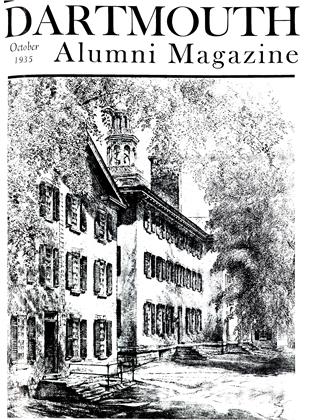1770-1870. By Fred L. Pattee '88. D. Appleton-Century Company.
It was twenty years ago this fall that members of the course in Emerson at Harvard University heard Professor Bliss Perry speak with enthusiasm of a new book that had just been published called "A History of American Literature Since 1870" by Fred Lewis Pattee. In the two decades that have followed, interest in American literature as a college study has developed enormously, and a major influence in the development has been exercised by Professor Pattee, historian, interpreter, and humanizer of American letters. Now Professor Pattee rounds out his studies of American literature with the publication of "The First Century of American Literature: 1770-1870."
Professor Pattee's approach and point of view are too well-known to need particular re-statement here. Coming upon the main stream by way of its significant tributaries, the significance of certain of which Professor Pattee was the first to point out, he has long since acquired a reputation for imparting vitality and interest to the discussion of such topics as gift-books and annuals, magazines and newspapers, the persistent strain of frontier humor, the persistent art form of the short story, all in their relationship to our national expression. Behind Professor Pattee's studies in literary history there is always a vivid sense of the American people as a reading and writing, and therefore a living, people. He is the most human of commentators.
His latest volume contains notable chapters on Frenau, Travelers and Emigres, the Discovery of the Indian, the Consumptive Poets, the "Feminine Fifties";
and, of course, Professor Pattee always has important things to say when he deals with the humorists, the "magazinists," the development of the short story, and other topics that he has made peculiarly his own. If the chapters on certain individual figures—Hawthorne, for instance, and Emerson—contribute somewhat less, it is because the scheme and scope of the work, the extent of the material to be covered, the necessary preoccupation with trend, group, and movement allow less room for the full discussion demanded if freshly penetrating treatment is to be given figures about whom so much has already been written.
The book is marked everywhere with the stamp of a scholar and a wise and understanding American. In his Preface Professor Pattee calls attention to the part played by two graduates of Dartmouth in recording American literary history. The first of these, Samuel Lorenzo Knapp, of the class of 1804, wrote the "first regular history of American letters." The second, Charles Francis Richardson, of the class of 1871, is' of course, famous among American teachers and literary historians. Add to these two names the name of Professor Pattee himself and you have a record of service to literary scholarship of which any college might be proud.
 View Full Issue
View Full Issue
More From This Issue
-
 Article
ArticleFRAGMENTS OF TRUTH
October 1935 By Ernest Martin Hopkins '10 -
 Class Notes
Class NotesClass of 1914
October 1935 By Edward Leech -
 Class Notes
Class NotesClass of 1911
October 1935 By G. Burleigh -
 Class Notes
Class NotesClass of 1910
October 1935 By Harold P. Hinman -
 Sports
SportsFOLLOWING THE BIG GREEN TEAMS
October 1935 By C. E. W. '30 -
 Article
ArticleFOOTBALL SQUAD "WELL ALONG"
October 1935
Kenneth A. Robinson
-
 Books
BooksFACULTY PUBLICATIONS
DECEMBER 1926 By Kenneth A. Robinson -
 Books
BooksWALT WHITMAN IN ENGLAND
October 1934 By Kenneth A. Robinson -
 Books
BooksBACK WHERE I CAME FROM
April 1939 By Kenneth A. Robinson -
 Books
BooksTHE WHITE STRANGER
May 1940 By Kenneth A. Robinson -
 Books
BooksFINGERBOARD
April 1950 By KENNETH A. ROBINSON -
 Books
BooksCONTEMPORARY DRAMA, ELEVEN PLAYS, AMERICAN, ENGLISH, EUROPEAN.
June 1957 By KENNETH A. ROBINSON
Books
-
 Books
BooksALUMNI PUBLICATIONS
January 1920 By c. c. s. -
 Books
BooksCITIES IN REVOLT; URBAN LIFE IN AMERICA,
December 1955 By EDWARD C. KIRKAND '16 -
 Books
BooksTHE COST BOOKS OF TICKNOR AND FIELDS AND THEIR PREDECESSORS
January 1950 By Harold G. Rugg '06 -
 Books
BooksWHERE THE POOLS ARE BRIGHT AND DEEP
November 1973 By JOHN HURD '21 -
 Books
BooksINDUSTRIAL RESEARCH AND TECHNOLOGICAL INNOVATION: AN ECONOMETRIC ANALYSIS.
DECEMBER 1968 By M. O. CLEMENT -
 Books
BooksWILLIAM ALLEN WHITES AMERICA
October 1947 By Robert Lincoln O'Brien '91


